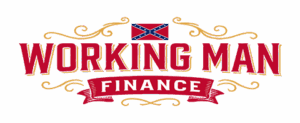The international drug trade is often portrayed in the mainstream media as a network dominated by shadowy cartels, ruthless gangsters, and far-flung criminal empires.
But what if the roots of the modern drug crisis extend deeper than popularly acknowledged, into the very heart of Western intelligence agencies?
This post delves into the disturbing and underreported connections between the CIA, Mossad, and the global narcotics trade, drawing on several courageous authors whose work lifts the veil on this dark alliance.
Dr. Alfred McCoy: The Trailblazer in Drug Trade Research
At the forefront of uncovering the true origins of the global drug crisis is Dr. Alfred McCoy, professor at the University of Wisconsin-Madison.
His groundbreaking book, The Politics of Heroin in Southeast Asia, first published in 1972 by Harper & Row, remains a cornerstone for anyone looking to understand the covert role intelligence agencies have played in the narcotics economy.
McCoy’s work was so damning that the CIA attempted to block its publication.
The book accused the CIA of complicity in drug trafficking throughout Southeast Asia during the Vietnam War.
McCoy documented how U.S. support for certain factions in Laos and Vietnam included turning a blind eye to, or even facilitating, their heroin smuggling operations.
In 1992, McCoy reissued the book under the title The Politics of Heroin: CIA Complicity in the Global Drug Trade.
A 2003 edition, published by Chicago Review Press, added updated research and a chilling preface outlining CIA efforts to suppress McCoy’s findings.
This book is essential reading for anyone interested in how intelligence agencies have manipulated the drug trade for geopolitical leverage.
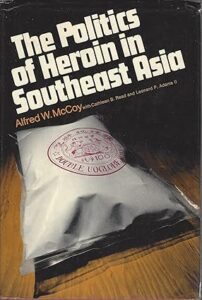
Meyer Lansky and the Jewish Syndicate’s Overlooked Role
While the Mafia has long been scapegoated as the prime mover behind organized drug trafficking, McCoy and others have shown that the reality is more nuanced.
The late Santo Trafficante Jr., Mafia boss of Tampa, Florida, has often been named by the mainstream media as a key figure in the Southeast Asian heroin pipeline.
However, Trafficante was far from independent—he reported to Meyer Lansky, the powerful Jewish crime boss who wielded significant influence over organized crime in America.
Hank Messick’s biography of Lansky is another crucial resource that exposes this often-suppressed connection.
Lansky’s extensive network and financial acumen allowed him to act as a bridge between traditional organized crime and elements within the intelligence community.
The tendency to place sole blame on the Italian Mafia conveniently diverts attention away from Lansky and other figures more deeply enmeshed in the machinery of both organized crime and intelligence.
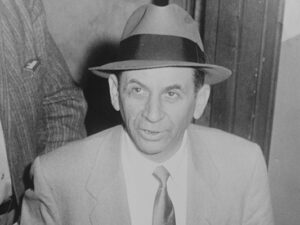
Alexander Cockburn & Jeffrey St. Clair: Media Complicity in the Cover-Up
Following McCoy’s revelations, journalists Alexander Cockburn and Jeffrey St. Clair pushed the conversation further in their 1997 book Whiteout: The CIA, Drugs and the Press, published by Verso.
This work focuses on how the American media systematically undermined journalist Gary Webb after he exposed CIA connections to the crack cocaine epidemic in the 1980s.
Webb’s investigative series, published in The San Jose Mercury News (not The Sacramento Bee, as sometimes misreported), laid bare how Nicaraguan Contras, backed by the CIA, were smuggling cocaine into the U.S., fueling the crack epidemic.
Instead of lauding his efforts, the mainstream press, including The New York Times, The Washington Post, and The Los Angeles Times, launched a coordinated smear campaign that discredited him and ultimately led to his professional downfall.
Whiteout revisits this scandal and explores broader patterns of CIA collaboration in the drug trade, backed by damning historical data.
It’s a critical resource for understanding how supposedly “respectable” media outlets act as gatekeepers, suppressing stories that challenge powerful institutions.
Gary Webb: The Journalist Who Knew Too Much
No discussion of this topic is complete without addressing the tragic story of Gary Webb.
After his fall from grace, Webb died under mysterious circumstances in 2004.
His death was ruled a suicide, but the fact that he reportedly shot himself twice in the head has led many to believe he was murdered.
While multiple gunshot suicides are rare but not unheard of, the unusual nature of his death continues to raise questions.
Webb’s fear of losing his job was very real. According to testimony from journalist Andrew St. George, Webb once abruptly ended a conversation when the topic turned to Israeli involvement in the drug trade.
St. George, a veteran reporter for The Spotlight, had met with Webb to discuss this angle, particularly the Mossad’s role in covert drug operations.
Webb, visibly shaken, stated he “could never write about what he knew about Mossad involvement with the CIA” for fear of losing his career.
This chilling episode illustrates the limits of journalistic freedom when stories intersect with powerful global intelligence interests.
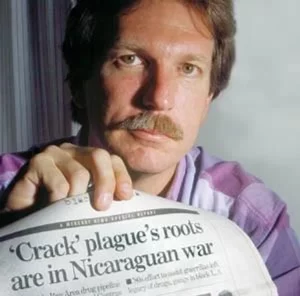
Israel’s Mossad and Its Hidden Role
While the CIA’s complicity in drug trafficking has gained some public awareness thanks to whistleblowers and independent journalists, Mossad’s role remains largely in the shadows.
Reports from journalists like Andrew St. George suggest that Israel’s intelligence apparatus has also been involved in drug networks, often operating in tandem with the CIA.
Yet, any attempts to scrutinize Mossad’s involvement are quickly labeled as fringe or conspiratorial, stifling meaningful discourse.
This systemic suppression ensures that the full picture of state-sponsored drug trafficking remains incomplete.
A Distorted History We’re Told to Accept
One of the most disturbing aspects of this suppressed history is how it reshapes our understanding of major political events.
Whether it’s the Vietnam War, the rise of the crack epidemic, or even America’s ongoing War on Drugs, each has been influenced by covert agendas masked as legitimate policy.
Even political scandals that have rocked American history—such as Watergate and the Clinton-Lewinsky affair—have served as distractions from deeper, more systemic corruption.
These events dominate headlines while the public remains unaware of the dark alliances fueling international crime from behind the scenes.
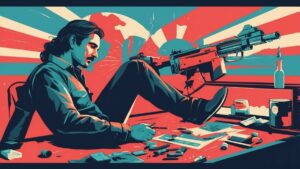
Why This Matters
Understanding the historical collusion between intelligence agencies and the drug trade isn’t just an academic exercise—it’s essential for citizens who want to make informed judgments about modern politics and policy.
The books and journalists mentioned above have risked their careers and reputations to expose these truths.
Let’s continue this journey into suppressed history together. Because the truth, however uncomfortable, is the only thing that can set us free.
